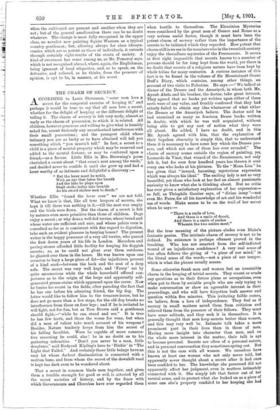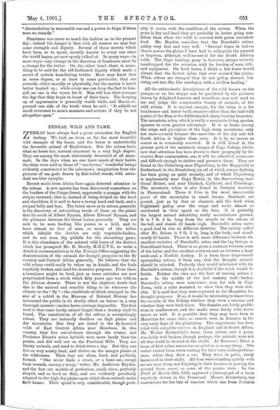THE CHARM OF SECRECY.
ACCORDING to Louis Stevenson, "some men love a secret for the congenial exercise of keeping it," and perhaps it would be true to say that all men love a secret, whether for the delight of keeping or the different delight of telling it. The charm of secrecy is felt very early, almost as
early as the charm of possession, to which it is related. All children, however generous and willing to give what is humbly
asked for, resent furiously any unauthorised interference with their small possessions ; and the youngest child whose intimacy you are so lucky as to have obtained will tell you something which " you mustn't tell." In fact, a secret to a child is a piece of mental property which may be reserved and added to the mental fortune, or may be conferred upon a friend,—as a favour. Little Ellie in Mrs. Browning's poem cherished a secret about " that swan's nest among the reeds," and decided never to confide it until she grew up and had a lover worthy of so intimate and delightful a discovery :—
" But the lover must be noble, With an eye that takes the breath And the lute he plays upon Shall strike ladies into trouble
As his sword strikes men to death."
Whether Ellie "found the lover ever" we are not told. What we know is that, like all true keepers of secrets, she kept it till there was nothing in it,—till the nest was empty and the birds were flown. But the charm of a secret is felt by natures even more primitive than those of children. Dogs enjoy a secret ; or why does a well-fed terrier, whose bread and
whose water are sufficient and sure, and whose palate even is consulted so far as is consistent with due regard to digestion, take such an evident pleasure in burying bones ? The present writer is the happy possessor of a very old terrier, who passed the first dozen years of his life in London. Macadam and paving-stones afforded little facility for keeping his doggish secrets; so, as he could not gloat over them outdoors, be gloated over them in the house. He was known upon one occasion to bury a large piece of fat—the injudicious present of a kind cook—between the back and the seat of a deep sofa. The secret was very well kept, and Foxey ' sat by quite unconscious while the whole household offered con- jectures as to the origin of the large and apparently self- generated grease-stains which appeared upon the cover. Now he buries his secret in the fields, after parading the fact that he has one before his admiring friend, the big dog. The latter would like to follow him to the treasure-house, but he dare not go more than a few steps, for the old dog brooks no interference from those on four legs ; and if he is irritated he will fight, not for fun, but as Tom Brown said a gentleman should fight,—" while he can stand and see." It is true he has few teeth, and those the worse for wear, but when did a man of valour take much account of his weapons ? Besides, Nature tenderly keeps from him the secret of his failing faculties. Were he capable of more consecu- tive reasoning he could, alas ! be in no doubt as to his gathering infirmities. " Don't you never be a man, little dorglums," said Rudyard Kipling's hero to Binkie ' in " The Light that Failed." And certainly those little beings have an easy lot whose darkest dissimulation is connected with a mutton bone, and from whom the secret of the downhill road is kept too dark even to be wondered about.
That a secret in common binds men together, and gives them a terrible strength for good or evil, is attested by all the secret societies of history, and by the fears with which Governments and Churches have ever regarded them
• -..--••-----• • ■ •
when hostile to themselves. The Eleusinian Mysteries were considered by the great men of Greece and Rome as a very serious social factor, though it must have been the potent charm of secrecy rather than the importance of the secrets to be initiated which they regarded. How potent that charm still is we see in the numbers who in the twentieth century enjoy the threadbare mysteries of the Freemasons. It seems at first sight impossible that secrets known to a number of persons should be for long kept from the world, yet there is no doubt that secrets of a religious nature have been kept by whole tribes for many centuries. A curious instance of this
fact is to be found in the volume of Sir Mountstuart Grant Duff's Diary, which contains, among other things, an account of two visits to Palestine. He says :—" We talked at dinner of the Druses and the Ansariyeh, in whom both Mr. Ayoub Abela and his brother, the doctor, take great interest. They agreed that no books yet written upon either of these sects were of any value, and frankly confessed that they had utterly failed to obtain any idea whatsoever of what either the Druses or the Ansariyeh believe. The doctor said he had examined as many as fourteen Druse books written in Arabic, with which he was well acquainted, without being able to get any sort of notion what they were all about. He added, I have no doubt, and in this Mr. Ayoub agreed with him, that the explanation of their hopeless obscurity is simply this, that to understand them it is necessary to have some key which the Druses pos- sess, and which not one of them has ever revealed." The charm of secrecy seems outside the region of painting, yet Leonardo da Vinci, that wizard of the Renaissance, not only felt it, but for over four hundred years has thrown it over every one who looks at his pictures. To the " Mona Lisa " he has given that " inward, haunting, mysterious expression which was always his ideaL" The smiling lady is not so very
beautiful, yet those who look at her feel an almost passionate curiosity to know what she is thinking about. But no critio has ever given a satisfactory explanation of her expression— so full, as Theophile Gautier says, of " divine irony "—not even Mr. Pater, for all his knowledge of art and his wonderful use of words. Blake seems to be on the trail of her secret when he says :— "There is a smile of love,
And there is a smile of deceit, And there is a smile of smiles
Wherein the two smiles meet."
But the true meaning of the picture eludes even Blake's fantastic genius. The intrinsic charm of secrecy is not to be defined. Its existence is perhaps oftenest proved in the breaking. Who has not smarted from the self-inflicted wound of an injudicious confidence ? A very real sense of loss often follows the giving of "a piece of our mind," in the literal sense of the words,—not a piece of our temper, which is what the phrase usually means.
Some otherwise frank men and women feel an irresistible charm in the keeping of trivial secrets. They resent or evade
any questions as to their future plans or occupations, even when put to them by amiable people who are only trying to make conversation or show an agreeable interest in their proceedings, and who will have forgotten both answer and question within five minutes. This irritating foible comes, we believe, from a love of independence. They feel as if secrecy in small matters saved them from criticism and relieved them from the pressure of their fellows. They must have some solitude, and they seek it in themselves. It is generally thought that men keep secrets better than women, and this may very well be. Intimate talk takes a more prominent part in their lives than in those of men. Having more insight into character than men, and on the whole more interest in the matter, their talk is apt to become personal. Secrets are often of a personal nature, and in personal conversation they sometimes spring out. But this is not the case with all women. We ourselves have known at least one woman who not only never told, but apparently never thought about a secret after it had once been confided to her. The knowledge she possessed did not apparently affect her judgment, even in matters intimately connected with it. She simply left that factor out of her mental sums, and to protect what she looked on as a piece of some one else's property confided to her keeping she had
" dissimulation in seasonable use and a power to feign if there were no remedy."
Frankness was never so much the fashion as in the present day; indeed the danger is that with all reserve we may lose some strength and dignity. Several of those secrets which have been, so to speak, secretly known to every one since the world began, are now openly talked of. In many ways—in most ways—any change in the direction of frankness must be a change for the better. On the other hand, there is some- thing to be said for the old-fashioned dignity which made a secret of certain humiliating truths. Most men know that in some degree, or at least in some particular, they are cowards, either morally or physically, but the matter is much better hushed up ; while every one can keep the fact to him- self, no one is the worse for it. Men will lose their courage the day that they begin to boast of their fears. The keeping up of appearances is generally worth while, and Bacon ex- pressed one side of the truth when he said : " It addeth no small reverence to men's manners and actions if they be not altogether open."











































 Previous page
Previous page